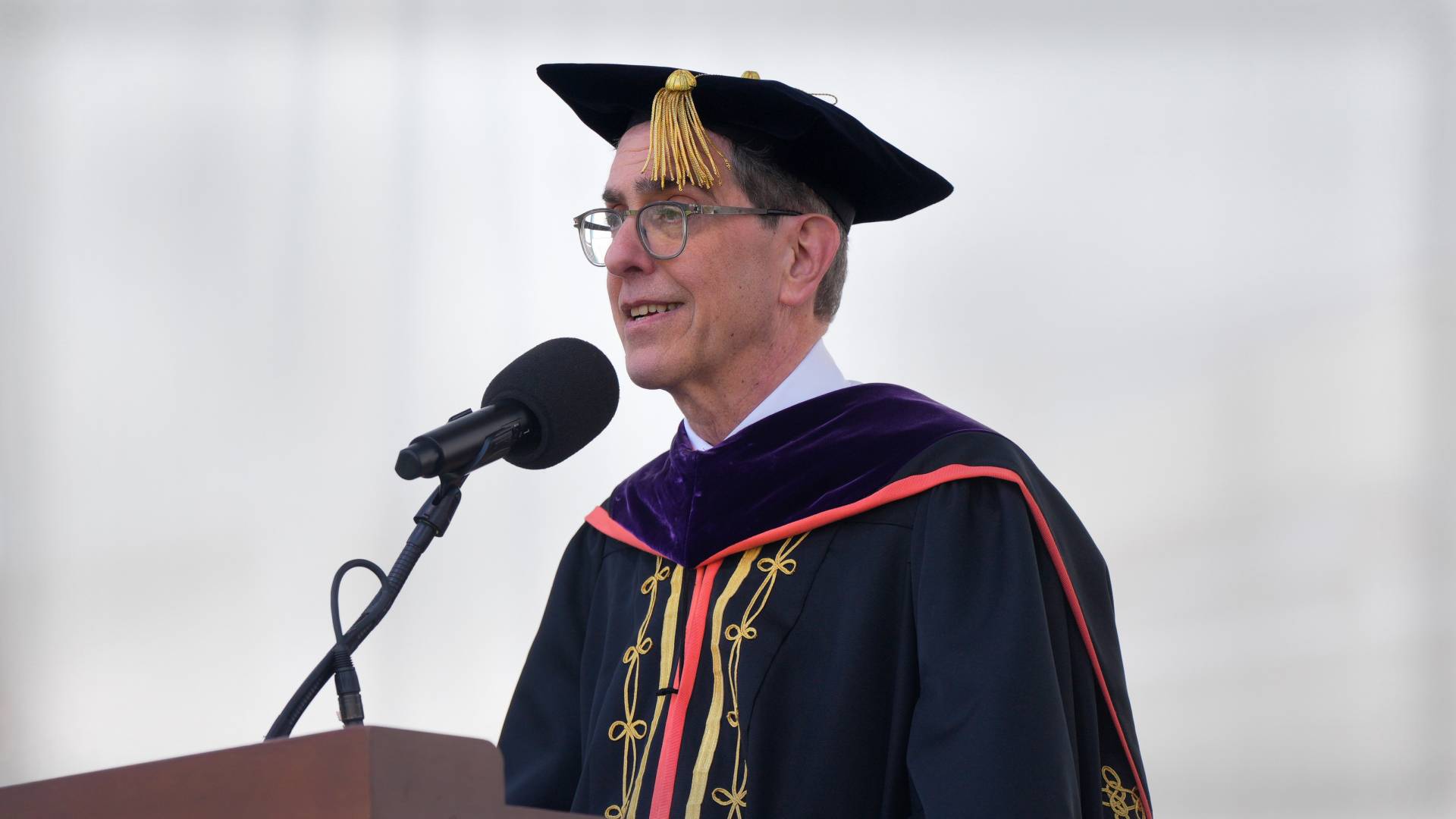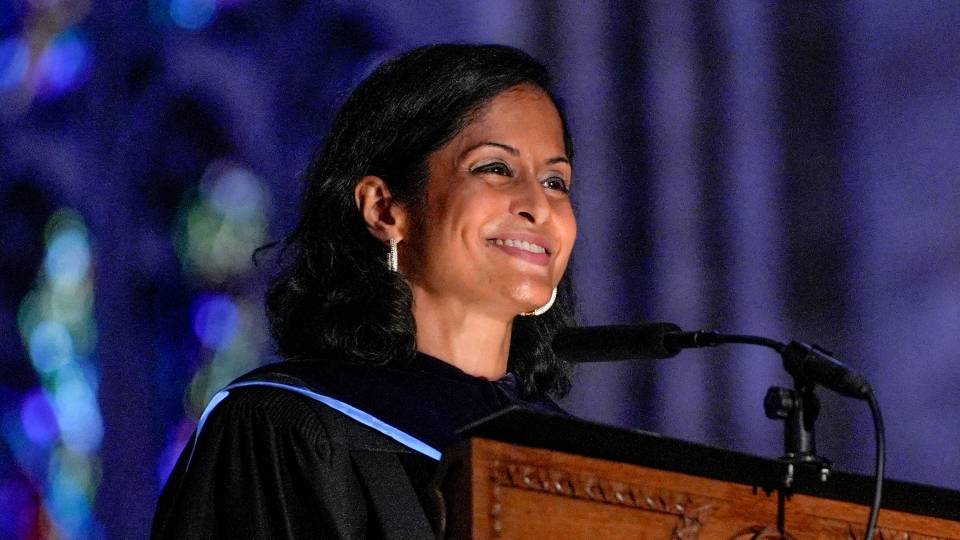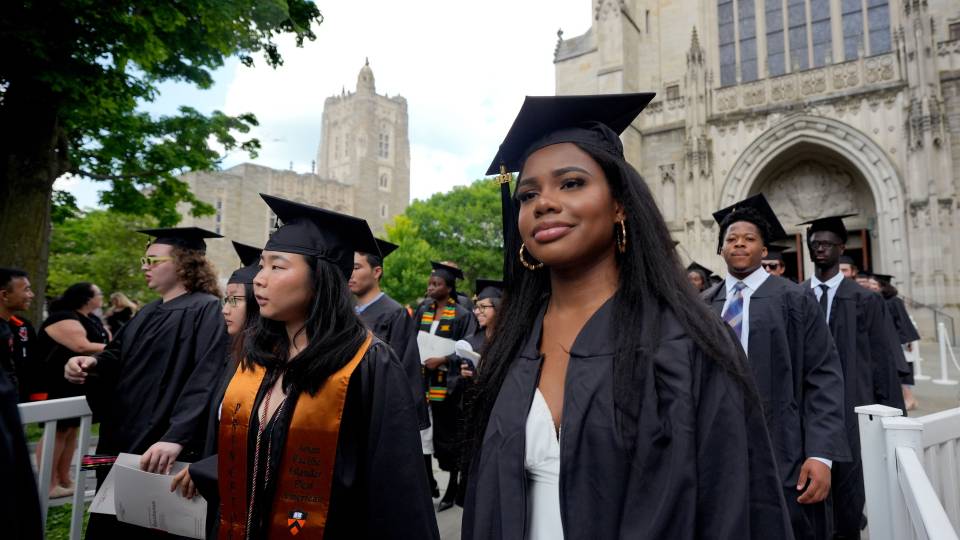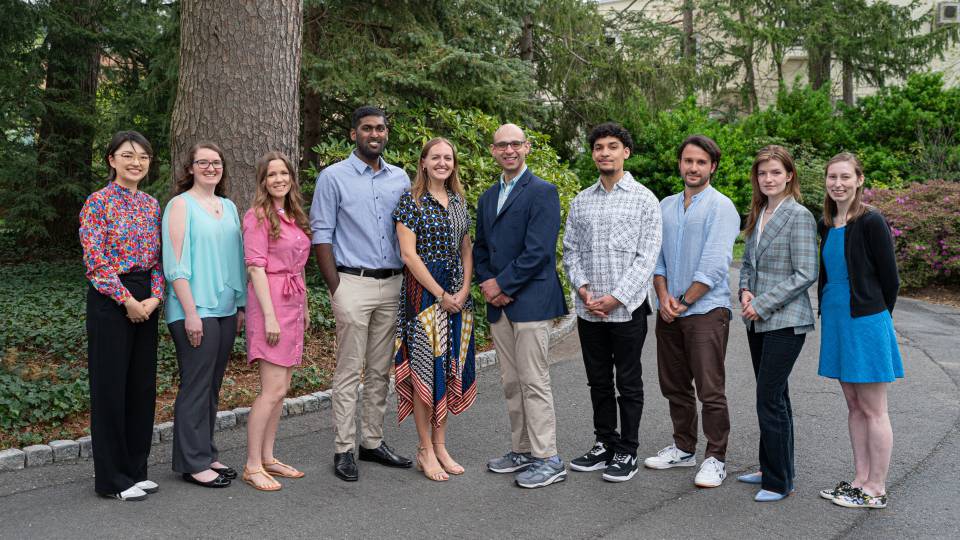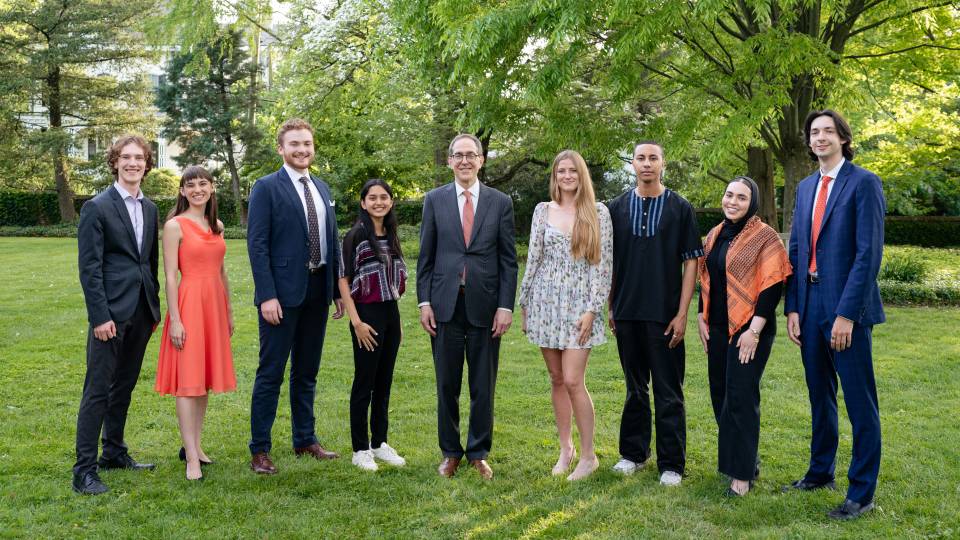In his Commencement address on May 28, 2024, Princeton President Christopher L. Eisgruber thanked the assembled graduates, with admiration, for the new life they had breathed into the University and extended a wish to them: “that you lean into life after Princeton, and into your communities wherever you are, with the same dazzling energy and imagination you showed while you were here." His Commencement address, “Leaning Into Life, at Princeton and Beyond,” appears here in full:
--as delivered--
In a few minutes, all of you will depart this stadium as newly minted graduates of this University. Before you do, however, it is Princeton’s longstanding tradition for the University president to offer a few remarks about the path that lies ahead of you.
I regard that annual opportunity as both a tremendous privilege and a great challenge, even in an ordinary year, and all the more so in this one. The Commencement address is a curious genre of public speaking. Thousands of them are delivered at colleges and high schools around the country every year.
Very few contain profound wisdom, and most are rapidly forgotten. I do not, for example, remember anything that President Bill Bowen said at my Commencement.
Fortunately, if perhaps somewhat inexplicably, the New York Times covered that 1983 speech, so I can tell you—from research, not recollection—that President Bowen urged my class to forsake selfish goals in favor of public service. Sensible advice, if not exactly earth-shattering. [1]
Cory Turner, reporting for NPR’s All Things Considered, divides Commencement messages into two categories: the “you are special” address, in which the speaker tells graduates that they have what it takes to solve the world’s most intractable problems, and the “you are not special” address, in which the speaker tells graduates that their success is due not only to talent and effort but also to assistance or luck, which they must pay forward to others. [2]
In an article about Commencement addresses published earlier this month, former Harvard President Drew Faust wrote that ChatGPT can produce “a script that sounds like every [graduation] speech you’ve ever heard.” [3]
In case you are wondering, ChatGPT urges—and now I think I am going to quote Drew Faust, not ChatGPT—that “[g]raduates should practice resilience, pursue purpose, nurture relationships, embrace change, innovate, accept their responsibility to lead, and persevere as they embark on their journey into ‘a world of infinite possibilities.’”
To these messages one might add the exhortation that we should all respect and listen to one another despite our political differences. That advice has become extremely popular now, at a time when very few people, young or old, seem genuinely disposed to take it.
Indeed, if graduation speeches were always a vexed genre, they have become more so in these polarized times, when the selection of Commencement speakers is a predictable flashpoint for campus controversy.
Princeton has mostly avoided that predicament by virtue of its rule that the president is the Commencement speaker every year, though in this year I recognize that I am myself a controversial choice for some of you.
In these deeply troubled times, I wish that I had some sage, original, and unforgettable counsel to offer you about how to heal our aching and torn world, or how to live well within it.
I do not think that I can claim such insight in this moment.
So let me instead use my time to offer my thanks and admiration for all of you who graduate today for what you have done while at Princeton—and also to offer you a wish for the years ahead.
I suppose that makes this, by the way, a “you are special” speech. My apologies to anyone who was hoping for the “you are not special” option!
I will begin with gratitude. I am grateful to you for the way that you have helped to restore and improve Princeton’s culture. Your energy and initiative were essential in the wake of a pandemic that, in addition to robbing us of so many other things, eroded the norms and habits of social activity.
During the COVID gap, club memberships dwindled; customs evaporated.
A varsity coach told me how surprised he had been to discover that some informal team gatherings no longer occurred.
An officer at Whig Clio described having to reconstruct unwritten rules that had existed for generations but were now forgotten.
We had to learn anew how to show up for one another and with one another. We had to recall, or reinvent, the rituals that knit us together and the practices that enable us to cooperate effectively with one another.
You came to Princeton, and you breathed new life into our community. You leaned into academic projects and extracurricular ones. You reconstructed, refreshed, and revitalized acapella groups, athletic teams, dance troupes, musical ensembles, religious and spiritual groups, debating societies, scientific laboratories, co-ops, eating clubs, entrepreneurial networks, the undergraduate and graduate student governments, the Triangle Show, the Princeton University Band, and countless other organizations.
You pursued independent research in dozens of countries. You embodied the enduring value of a broad, liberal arts education by immersing yourselves at the intersection of disciplines—engineering and music, biology and literature, computer science and ancient texts—in the process forging meaningful new areas of research and scholarship.
For that, I am grateful to you.
My wish for you is that you lean into life after Princeton, and into your communities wherever you are, with the same dazzling energy and imagination you showed while you were here. In a world where “remote work” and “remote everything” are possible and tempting, I hope you will continue to show up in person, fully and humanly. By doing so you will contribute to the world. You will also, I hope, find joy in what you do.
If I have any wisdom to offer you today, it is this: happiness often comes from collective human endeavor to produce something of value to society. The goals need not be grand or newsworthy.
The happiness I am describing is what can make it so satisfying to be part of an athletic team, a theater group, a community garden, a religious congregation, or a workplace. The shared quest to achieve something worthwhile can be deeply meaningful even if it is not headline-making.
I hope, too, that Princeton will remain one source of community in your life. As this weekend’s festive Reunion activities demonstrated, Princeton alumni remain devoted and engaged with this University long after they complete their degrees. That is true whether they are on campus for Reunions or far beyond the FitzRandolph Gate. I hope you will enjoy the opportunity to sustain the connections that you formed here and to form new ones with Princetonians across time zones and generations.
For now, all of us on this platform wish you well on the journey that lies ahead. Whether you receive today a doctoral degree, a master’s degree, or an undergraduate degree, we hope that you will return often to Old Nassau and consider this campus one of your homes. We will welcome you then as we cheer you today, wishing you every success as Princeton University’s Great Class of 2024!
[1] James Barron, “Princeton Head Tells Graduates to Serve Society,” New York Times (June 8, 1983).
[2] Cory Turner, “Anatomy of a Great Commencement Speech,” All Things Considered, NPR (May 20, 2014).
[3] Drew Gilpin Faust, “The Strange Ritual of Commencement Speeches,” Atlantic (May 8, 2024).
